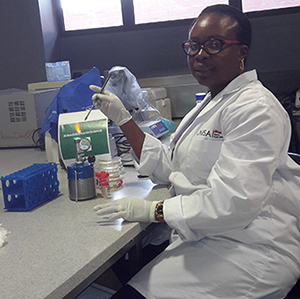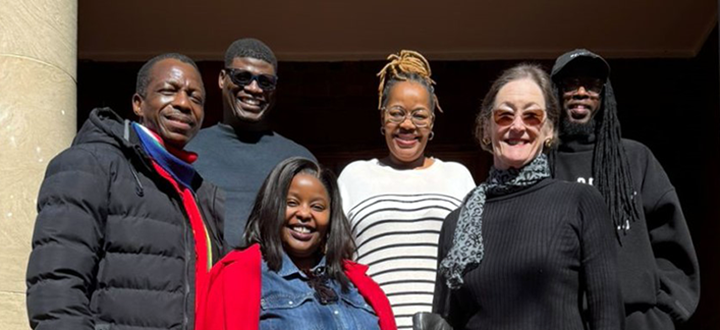College of Agriculture & Environmental Sciences
Nature-based solutions to restore our beautiful land

Dr Chioma Blaise Chikere
The Department of Environmental Sciences in the College of Agriculture and Environmental Sciences (CAES) hosted an African Visiting Scholar Lecture on 15 July 2021, under the theme "Nature-based solutions to eco-restoration of oil-impacted soils in line with UN SDG 15 – Life on Land".
CAES extended a warm welcome to Dr Chioma Blaise Chikere, who was the visiting African scholar for the day. Chikere is an Academic Associate in the Department of Environmental Sciences. Her specialisation is molecular environmental/petroleum microbiology, and her research interest is the use of green and nature-based solutions in the bioremediation of crude oil-impacted sites in the oil-rich Niger Delta region of Nigeria. Chikere is globally recognised for her contribution to sustainable environmental eco-restoration in the Niger Delta, where her bioremediation project fully restored biodiversity and ecosystem services at a barren, oil-polluted site by identifying the complex microbial interactions underpinning petroleum biodegradation.
In her lecture, Chikere explained that contamination of coastal and terrestrial ecosystems by oil has had severe environmental and economic consequences in the Niger Delta region. Although technologies for oil drilling have advanced rapidly in recent decades, strategies for responding to oil spills and assessing environmental impacts of oil contamination have lagged. An understanding of the impacts of oil on indigenous microbial communities and identification of oil-degrading microbial groups using both culture-dependent and molecular approaches are a vital part of directing the management and clean-up of oil-contaminated ecosystems.
Her research focuses on the use of nature-based solutions to enhance microbial activities in oil-impacted sites, with the ultimate goal of pollutant biodegradation and ecosystem restoration. She employs high-throughput techniques such as next-generation sequencing, bioinformatics and chromatographic procedures to evaluate the effect of long-term exposure to petroleum hydrocarbons on soil microbes. She also uses these methods to evaluate and monitor the progress of bioremediation at field-scale level to establish eco-restoration of biological diversity within the compliance limits enshrined in the guidelines published by the Department of Petroleum Resources.
With the methods and guidelines applied, eco-restoration of crude-oil polluted arable soil and biodiversity recovery at Ngia Ama were achieved. Activities such as the destruction of oil installations and infrastructure by local youths were halted as these young people were engaged to carry out the site work, and host locals were able to generate revenue through selling animal litter for use in the bioremediation project. The nature-based green fertiliser formulated by Chikere’s research team is awaiting the outcome of a patent application. During the site remediation project, her team formulated various types of nature-based, green organic and inorganic slow-release fertilisers from agricultural and industrial waste materials; these fertilisers contain nitrogen, phosphorus and potassium in stoichiometric ratios adequate for the supply of essential nutrients to enhance the microbial activity necessary for the biodegradation of petroleum hydrocarbons.
The field-scale bioremediation of crude oil-polluted soil has set a benchmark for innovation in monitoring pollutant degradation; for instance, metabolomics analysis of the soil metabolome provided deeper insight into the biochemical reactions underpinning biodegradation of complex hydrocarbons. This technology is particularly suited for use in developing countries where bioremediation can be used to restore impacted ecosystems to their original state. It is simple and eco-friendly, and can be carried out by locals, which greatly aids in its acceptance.
Nature-based approaches for ecosystem restoration present sustainable options that help to halt, reverse and prevent negative impacts of anthropogenically-induced pollution and climate change. Restoring ecosystems means protecting their biodiversity (the spread, distribution, number and variety of species of plants, animals and microbes within a habitat) and helping them deliver benefits for both people and nature.
* By Gugulethu Ngcobo, Admin Marketing Assistant, College of Agriculture and Environmental Sciences
Publish date: 2021-07-29 00:00:00.0


 Shedding light on the well-being of ODeL facilitators
Shedding light on the well-being of ODeL facilitators
 A giant leap for student success and retention
A giant leap for student success and retention
 SWEEP: Where women entrepreneurs take the lead
SWEEP: Where women entrepreneurs take the lead
 A sense of belonging and excellence nurtured through collaboration
A sense of belonging and excellence nurtured through collaboration
 Wielding her Unisa PhD, Botswana educator champions early childhood development
Wielding her Unisa PhD, Botswana educator champions early childhood development